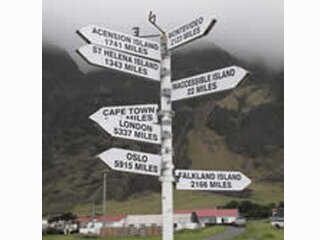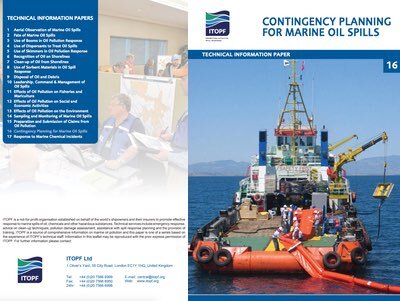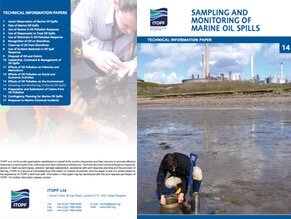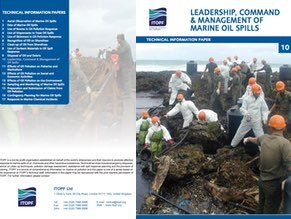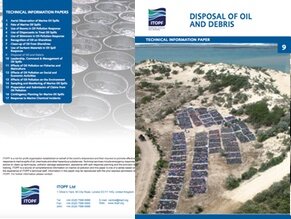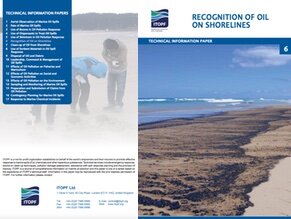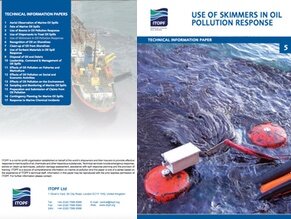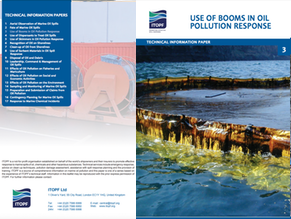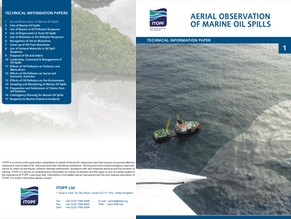Documents & Guides
Explore a variety of topics about marine spills, response and compensation matters in the pages below.
Each topic and area of interest provides access to more detailed documentation that is freely downloadable.
This includes our 18 Technical Information Papers which are fully illustrated with photos and diagrams and are available in several languages.
Compensation for Ship-source Marine Oil Spills
What legal arrangements and sources of compensation are available for a spill from a ship?
Disposal
What planning and waste management systems need to be put in place to reduce the volume of oily waste for treatment or disposal?
HNS
What are the specific chemical response strategies for responding to a Hazardous and Noxious Substance spill, and what are the potential effects on human and marine life?
Contingency & Response Planning
What information is needed for an effective oil spill contingency plan? How can aerial observation and protective strategies assist with response operations?
Economic Effects
Which industries might suffer temporary economic losses and loss of market confidence?
Fate of Oil Spills
What happens to oil in the marine environment over time when spilled at sea? How do different factors such as volume and physical and chemical properties affect the fate of oil spills?
Explore the Resources
Displaying results 11 to 19 out of 19
- « Previous
- 1
- 2
Responding to spills in remote locations (2012)
Over the years, ITOPF has regularly attended incidents in relatively remote locations with limited response capacities and/or limited contingency planning arrangements in place.
Categories: Response Techniques, Planning & operations, Spill Response, Papers
TIP 16: Contingency planning for marine oil spills
This paper outlines the typical format and content of contingency plans for response to ship-source spills and highlights the key steps required for an effective plan.
Categories: Planning & operations, Technical Information Paper (TIPS)
TIP 14: Sampling and monitoring of marine oil spills
This paper provides a broad overview of the monitoring and sampling procedures that can be used for qualitative and quantitative monitoring of oil contamination. While qualitative analyses can confirm the source of oil contamination, monitoring programmes are often concerned with the quantitative changes in hydrocarbon levels over time. Guidance on analytical best practice is given and common terminology is explained. However, the techniques and observations required to monitor specific ecological or biological effects and to monitor contaminants in the air are beyond the scope of this paper.
Categories: Environmental effects, Planning & operations, Technical Information Paper (TIPS)
TIP 10: Leadership, command & management of oil spills
This paper considers many of the situations encountered in a response to ship-source pollution and explains how effective leadership, command and management can maximise the success of response operations. Many of the subjects touched on are discussed in greater detail in other ITOPF papers in this series, as listed on the back cover, but in particular, the paper on Contingency Planning for Marine Oil Spills.
Categories: Planning & operations, Technical Information Paper (TIPS)
TIP 09: Disposal of oil and debris
This paper explores the various options available for the management of waste material generated as a result of ship-source oil spills in the marine environment.
Categories: Planning & operations, Disposal, Technical Information Paper (TIPS)
TIP 06: Recognition of oil on shorelines
In cases of large spills, the source of stranded oil may be obvious, but the question of identification frequently arises when a small amount of oil is involved and compensation is sought for damage or clean-up costs. The purpose of this paper is to assist the reader in recognising both the type and quantity of oil on differing shorelines.
Categories: Response Techniques, Planning & operations, Technical Information Paper (TIPS)
TIP 05: Use of skimmers in oil pollution response
This paper describes the fundamental requirements for the successful use of skimmers in the situations most likely to be encountered during an oil spill and should be read in conjunction with other ITOPF papers in this series, in particular, on the use of booms, shoreline clean-up techniques and the disposal of oil.
Categories: Response Techniques, Containment & Recovery, Planning & operations, Technical Information Paper (TIPS)
TIP 03: Use of booms in oil pollution response
This paper describes the principles of boom design and the two main modes of operation, namely towing by vessels at sea and mooring in shallow or inshore waters.
Categories: Response Techniques, Containment & Recovery, Planning & operations, Technical Information Paper (TIPS)
TIP 01: Aerial observation of marine oil spills
This paper presents advice and guidance on conducting effective aerial reconnaissance.
Categories: Fate of Oil Spills, Response Techniques, Planning & operations, Spill Response, Technical Information Paper (TIPS)
Displaying results 11 to 19 out of 19
- « Previous
- 1
- 2

